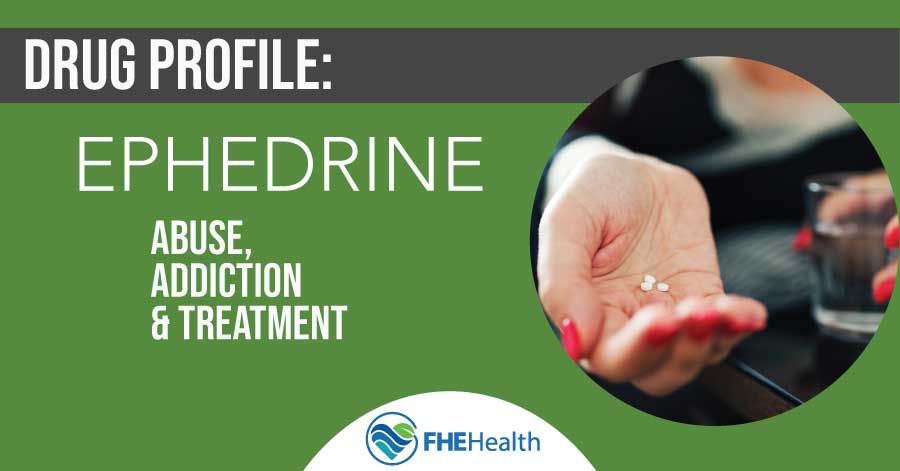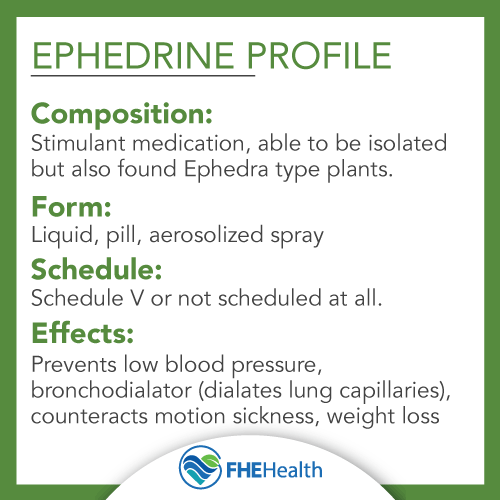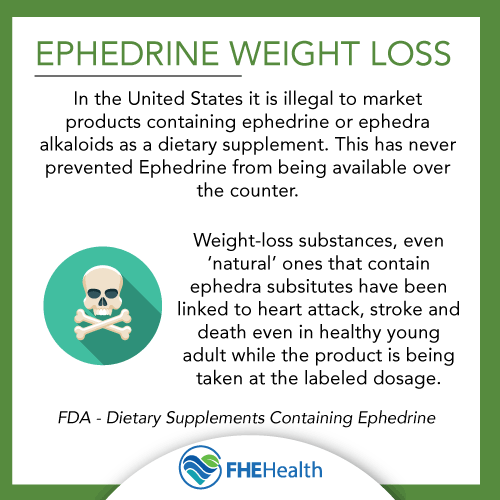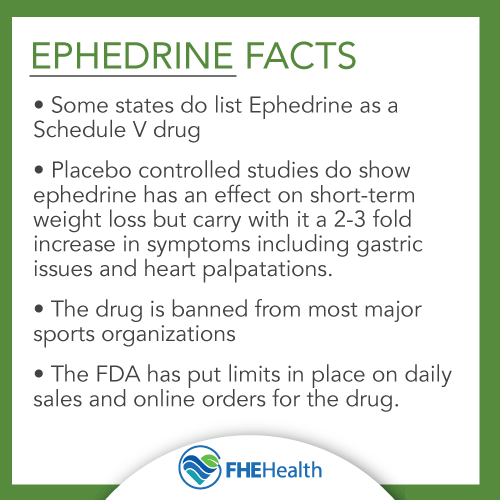
If the name “ephedrine” sounds familiar to you, it may be because you have some familiarity with pseudoephedrine (Sudafed). Pseudoephedrine was a standard antihistamine used to treat sinus colds and allergy symptoms, before becoming heavily regulated due to its potential (as a precursor to methamphetamine) to be abused.
Ephedrine is the natural form of Sudafed, with more specialized medical uses than its cousin, which is why it’s a lesser-known substance. Most drugs and supplements that contain ephedrine contain a synthetic form of the substance.
What follows is a guide to ephedrine: what it is, what it’s used for, and the risks associated with it.
What Is Ephedrine?
Ephedrine is a stimulant medication with a narrow scope of use in modern medicine. Derived from a Chinese herb known as ma huang, ephedrine is not widely known or easy to access. As such, it isn’t known to be a drug that many people abuse, and many people may not be aware of its non-medical uses.
How Does Ephedrine Fit into American Culture and Society?
 The lack of social awareness about ephedrine means that it isn’t something commonly seen in pop culture or in the media. Of course, the drug enjoys greater familiarity among the social circles that use it. We’ll discuss off-label use (and abuse) in more detail shortly, but for now suffice it to say that the two groups most likely to use ephedrine outside of its medical purposes are weight lifters and bodybuilders, because of the drug’s advertised potential to enhance sports performance and help users lose weight. After the 2000 Summer Olympics in Sydney, for example, the World Anti-Doping Agency (WADA) noted the use of performance-enhancing drugs containing ephedrine and pseudoephedrine, which led to heavier regulation in future competitions.
The lack of social awareness about ephedrine means that it isn’t something commonly seen in pop culture or in the media. Of course, the drug enjoys greater familiarity among the social circles that use it. We’ll discuss off-label use (and abuse) in more detail shortly, but for now suffice it to say that the two groups most likely to use ephedrine outside of its medical purposes are weight lifters and bodybuilders, because of the drug’s advertised potential to enhance sports performance and help users lose weight. After the 2000 Summer Olympics in Sydney, for example, the World Anti-Doping Agency (WADA) noted the use of performance-enhancing drugs containing ephedrine and pseudoephedrine, which led to heavier regulation in future competitions.
Ephedrine is also known in some circles for its use as a precursor in the production of methamphetamine, like its relative, pseudoephedrine (also known by its street name “pseudo”). (Unlike “pseudo,” ephedrine doesn’t bear any street slang names.)
Ephedra vs. Ephedrine
Some products containing ephedrine—especially those advertised for sports performance enhancement—claim that they contain a substance called “ephedra” instead of ephedrine. “Ephedra” is another name for the ma huang plant, the source of the ephedrine compound. Many supplements and products not generally approved by the FDA contain ephedrine, ephedra, or a mix of both.
How to Identify Ephedrine
Identifying ephedrine is difficult. Since it’s used in many products, it can come in many forms. Most over-the-counter supplements for weight loss and performance enhancement come in the form of round, white pills. This can also be how medical-grade ephedrine is packaged, although more commonly medical-grade ephedrine is injectable.
Uses for Ephedrine
There are a few primary uses for ephedrine. The obvious one is as prescribed by medical professionals. Medically, ephedrine is used to regulate blood pressure during certain types of surgical procedures. In rarer cases, doctors prescribe ephedrine to treat conditions like asthma, narcolepsy, and certain heart rhythm issues.
In the past few decades, ephedrine has become much more widely recognized for its off-label uses, namely in the areas of weight loss and athletic performance. Yet studies suggest that the health risks of taking ephedrine for these purposes far outweigh the potential benefits.
Ephedrine Pills for Weight Loss
 One popular use for ephedra and ephedrine is weight loss. Weight loss supplements and other products typically mix ephedrine with caffeine, which is actually proven to be effective for marginal weight loss. The National Institutes of Health (NIH) cites studies that show that while these drugs aren’t the “miracle formulas” they claim to be, users have shown statistically significant weight loss in key trials.
One popular use for ephedra and ephedrine is weight loss. Weight loss supplements and other products typically mix ephedrine with caffeine, which is actually proven to be effective for marginal weight loss. The National Institutes of Health (NIH) cites studies that show that while these drugs aren’t the “miracle formulas” they claim to be, users have shown statistically significant weight loss in key trials.
The NIH goes on to note that the downsides may well outweigh the benefits of using these supplements, however, suggesting that more testing is needed to explore the incidence of risk. People who take supplements containing these ingredients in conjunction with caffeine have experienced strokes, organ failure, and other severe side effects.
Ephedrine and Sports Performance
Ephedrine use in the performance enhancement market is also receiving a closer look, one reason being the drug’s potential link with exercise addiction. Exercise addiction is a disorder in which people feel the need to compulsively work out, take dangerous supplements and steroids, and deprive themselves of a certain quality of life in favor of their physical appearance.
High-performing athletes and bodybuilders are probably the target demographic for ephedrine use in this capacity. The effectiveness of these performance-enhancing ephedrine pills are still in question, but a few things are clear: these supplements are not considered safe; they also are not regulated or approved by the FDA, and have been outlawed by most major sports leagues and federations worldwide.
Ephedrine as a Precursor in Cooking Meth
Several major ephedrine seizures around the U.S., in Canada, and in other areas have revealed that while pseudoephedrine is still the more popular choice as a precursor in the production of methamphetamine, ephedrine is used as well when there is access to it.
Ephedrine Abuse
 The topic of ephedrine abuse is not talked about much, because of the drug’s positioning as a non-addictive supplement. In terms of the drug’s sheer physical addictiveness, this is accurate— but the health risks that can occur when taking the drug as directed make it important to understand how ephedrine is “abused.” After all, substance abuse doesn’t always have to mean overusing a drug or using it not as directed. When the drug itself is dangerous, substance abuse can mean taking the drug in any capacity. And, according to the New York Office of Alcoholism and Substance Abuse Issues, drugs that contain ephedrine and other ephedra derivatives have been responsible for seizures, heart attacks, strokes, and a whole host of adverse reactions when used with other medications.
The topic of ephedrine abuse is not talked about much, because of the drug’s positioning as a non-addictive supplement. In terms of the drug’s sheer physical addictiveness, this is accurate— but the health risks that can occur when taking the drug as directed make it important to understand how ephedrine is “abused.” After all, substance abuse doesn’t always have to mean overusing a drug or using it not as directed. When the drug itself is dangerous, substance abuse can mean taking the drug in any capacity. And, according to the New York Office of Alcoholism and Substance Abuse Issues, drugs that contain ephedrine and other ephedra derivatives have been responsible for seizures, heart attacks, strokes, and a whole host of adverse reactions when used with other medications.
Is Ephedrine Addictive?
Some states choose not to classify ephedrine as a controlled substance. Those that do generally see it as a schedule IV or V controlled substance, the tiers that typically contain drugs with the lowest comparative potential for abuse.
Ephedrine is not generally thought to be addictive, but as suggested above, can play a role in various behavioral addictions and mental health disorders, such as:
- Exercise addiction – supplements containing ephedrine often drive unhealthy habits in the athletic and bodybuilding communities.
- Eating disorders and body dysmorphia – there is a whole subset of mental health issues that stem from body image and self-esteem. A weight loss supplement that advertises fast results can be a contributing or enabling factor in conditions like these.
Treatment for Ephedrine Use Disorders
Because ephedrine’s potential for physical addiction is so low, addiction treatment facilities like FHE Health don’t often treat ephedrine addiction alone. Sometimes people struggling with addiction to another substance can have a problem with ephedrine abuse, or, the main presenting issue may be an eating disorder or exercise addiction that involves ephedrine.
Patients who enter treatment for these issues can expect to receive intensive counseling that helps them address the root issues behind their use of ephedrine. Care is taken to reinforce positive behaviors, instill healthy coping devices, and build a healthier sense of self-image. Every patient is different, so there is no “one size fits all” treatment method that is effective for everyone.
The Bottom Line: Ephedrine
Ephedrine is not very well-known and not highly regarded in its potential for abuse and addiction, but as we’ve seen, consuming it in forms not regulated by the FDA or recommended by medical professionals can carry some potentially severe health risks.
If you or someone you know is abusing ephedrine, contact FHE Health and speak to one of our caring addiction professionals. We can help.






